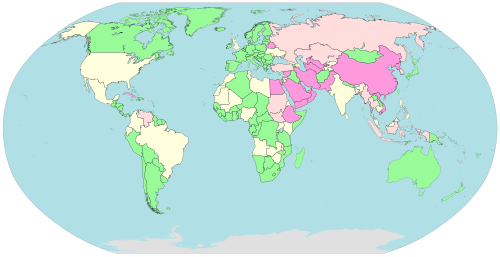Филтри интернет
Филтри Интернет ё Филтринг, иборат аз маҳдуд кардани дастрасии корбарони Интернет ба вебгоҳҳо ва хадамоти интернетӣ, ки аз дидгоҳи матулиёни фарҳангӣ ва сиёсии ҳар кишвар барои масрафи умум муносиб нест, амали филтр маъмулан ба василаи ироадиҳандагони хадамоти интернетӣ анҷом мешавад, вале таъйини сатҳ, масодиқ ва сиёсатҳои филтиринг бо ҳукуматҳост[1].

Кишварҳои Белорус, Мянмар, Чин, Куба, Миср, Эрон, Куриёи Шимолӣ, Арабистон, Сурия, Туркманистон, Ӯзбекистон, ва Ветнам аз бузургтарин филтркунандагони Интернет дар ҷаҳон ҳастанд. Албатта бояд ба ин мавзӯъ ишора кард, ки миёни кишварҳои таҳти назар, Русия ва Австралия фақат масоиле, ки аз назар ахлоқи мушкил дорандро филтр мекунанд. Ба гуани ки дар ин ду кишвар гурӯҳҳои зери шохаи аз пулисро барои назорат бар ин сайтҳо ташкил додаанд.

██ Pervasive censorship ██ Substantial censorship ██ Selective censorship ██ Under surveillance by Reporters Without Borders ██ Little or no censorship ██ Not classified / no data
OpenNet Initiative reports
вироишИн мақола ё фасл тарҷумаи нопурра аз забони хориҷаро дорад. |
Through 2010 the OpenNet Initiative had documented Internet filtering by governments in over forty countries worldwide. The level of filtering in 26 countries in 2007 and in 25 countries in 2009 was classified in the political, social, and security areas. Of the 41 separate countries classified, seven were found to show no evidence of filtering in all three areas (Egypt, France, Germany, India, Ukraine, United Kingdom, and United States), while one was found to engage in pervasive filtering in all three areas (China), 13 were found to engage in pervasive filtering in one or more areas, and 34 were found to engage in some level of filtering in one or more areas. Of the 10 countries classified in both 2007 and 2009, one reduced its level of filtering (Pakistan), five increased their level of filtering (Azerbaijan, Belarus, Kazakhstan, South Korea, and Uzbekistan), and four maintained the same level of filtering (China, Iran, Myanmar, and Tajikistan).[3]
Эзоҳ
вироиш- ↑ Аз Википедиаи форсӣ http://fa.wikipedia.org/wiki/%D9%81%DB%8C%D9%84%D8%AA%D8%B1_%D8%A7%DB%8C%D9%86%D8%AA%D8%B1%D9%86%D8%AA%DB%8C
- ↑ OpenNet Initiative "Summarized global Internet filtering data spreadsheet", 8 November 2011 and "Country Profiles", the OpenNet Initiative is a collaborative partnership of the Citizen Lab at the Munk School of Global Affairs, University of Toronto; the Berkman Center for Internet & Society at Harvard University; and the SecDev Group, Ottawa
- ↑ 3.0 3.1 Due to legal concerns the OpenNet Initiative does not check for filtering of child pornography and because their classifications focus on technical filtering, they do not include other types of censorship.
- ↑ Internet Enemies Бойгонӣ шудааст 23 марти 2012 сол., Reporters Without Borders (Paris), 12 March 2012